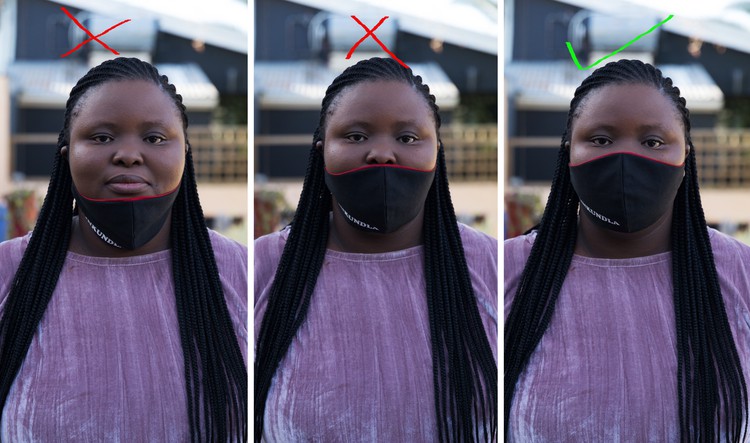
22 October 2020
Thembela Ntongana, GroundUp’s chairperson, demonstrates in the first two photos how NOT to wear a mask. In the right photo she wears it properly. Photos: Ashraf Hendricks
There is little appetite, economically or psychologically, for another strict national lockdown. Covid-19 will be with us for a while. We have to learn to live with it.
Simple messages which help people reduce their risk of infection are what we need, not complicated, over-zealous or moralising public health advice, or expensive “behaviour change” programs. What needs to be done is not complicated:
1. Give people space and avoid shaking hands, hugging or physical contact with people you are not intimate with.
There are still unanswered questions about how SARS-CoV-2 is spreading, but it appears the most common way is through close contact with other people coughing, sneezing and speaking (as opposed to picking it up from surfaces or droplets hanging about in the air for a long time). So this is probably the most important of the four messages. It follows from it that if you find yourself in a crowded area, like a busy nightclub, leave.
2. Wear a mask over your face when you are near people who are not from your household.
It’s important to wear masks PROPERLY inside shopping centres, or when work colleagues are nearby or when you’re using public transport. Outside, you need to exercise judgment.
Most people do not wear their masks when they’re outside, or wear them with their noses uncovered, which is pointless. In most outdoor situations wearing a mask is probably unnecessary or making a marginal contribution to risk reduction. Of course if you’re out somewhere like the Sea Point promenade on a lovely Sunday afternoon, it’s going to be very busy, and a mask seems sensible.
3. Stay home when ill.
This should be one rule that everyone wants to adhere to (even though many work cultures have discouraged it). It’s possible that if people stick to this, counter-intuitively, the number of sick days across workplaces will be reduced, simply because we’ll not be giving our infectious diseases to each other as often.
4. Wash hands.
This is definitely good advice for avoiding many kinds of infections. And it may also be useful against Covid.
There are some duties for government which flow out of these rules.
If we want people to wear masks, the authorities must ensure that effective, comfortable masks are widely available. Just as we had massive condom distribution programmes to reduce HIV infections, there should be mass distribution of low-cost masks, prioritising those who need them most (which would include people living in high density shack settlements).
Second, if we want people to wash their hands, the serious water delivery failures in various parts of the country must be fixed. This needs to be addressed urgently.
Third, if we want people to give each other space — to physically distance — we have to be aware of how difficult this is for a significant part of the population. While government has made progress since 1994 in the provision of decent housing, it’s a serious failure that in 2020 a middle-income country like SA has a large proportion of its urban population living in high density shack settlements and taking long unsafe trips to get to work. We need a concerted civil society and government effort to address this, and to support activist organisations campaigning for affordable housing.
Finally, we can adhere 100% to all four messages and still contract SARS-CoV-2. Some people will completely ignore the recommendations and yet be lucky enough never to get it. But the probability is if most of us follow the four messages most of the time, most of us are likely to avoid Covid-19. Public health is about risk reduction; there are no guarantees. And there should be no stigma or blame associated with contracting an infection.